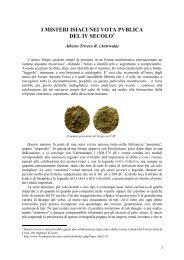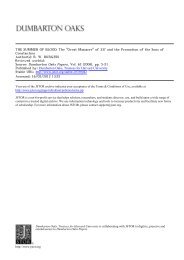Rome, Constantinople, and the Barbarians - Constantine the Great
Rome, Constantinople, and the Barbarians - Constantine the Great
Rome, Constantinople, and the Barbarians - Constantine the Great
You also want an ePaper? Increase the reach of your titles
YUMPU automatically turns print PDFs into web optimized ePapers that Google loves.
<strong>Rome</strong>, <strong>Constantinople</strong>, <strong>and</strong> <strong>the</strong> <strong>Barbarians</strong> 277<br />
able Sulpicius's account of it may be, is as much an internal one as if, instead,<br />
<strong>the</strong> strife of domestic factions had undermined <strong>the</strong> state. Should we not have<br />
something like this in mind when thinking of <strong>Rome</strong> <strong>and</strong> <strong>the</strong> barbarians?<br />
MORE THAN POETIC CONVENTION was involved in <strong>the</strong> practice that late ancient<br />
authors adopted of portraying <strong>the</strong> tribes of <strong>the</strong>ir time under anachronistic<br />
names drawn from Herodotus <strong>and</strong> Tacitus. Disguising <strong>the</strong> Goths as Getae or<br />
Scythians, <strong>the</strong> Franks as Sicambri, <strong>and</strong> <strong>the</strong> Huns as Massagetae expressed <strong>the</strong><br />
underlying truth that <strong>the</strong>re had been no change of substance beyond <strong>the</strong> fron-<br />
tiers. The turbulent tribes of yesteryear prolonged <strong>the</strong>ir existence under new<br />
names; as <strong>the</strong>y had once been kept in check, so could <strong>the</strong>y be today.6 The Celts<br />
who had captured <strong>Rome</strong> in 390 B.C. <strong>and</strong> burned it down, Hannibal <strong>and</strong> <strong>the</strong><br />
Carthaginians, <strong>the</strong> redoubtable Mithridates of Pontus, Ariovistus <strong>and</strong> Ver-<br />
cingetorix in Gaul-all <strong>the</strong>se <strong>and</strong> many more were no less barbarian than <strong>the</strong><br />
Dacians of <strong>the</strong> high empire <strong>and</strong> <strong>the</strong> Goths <strong>and</strong> Huns in <strong>the</strong> 370s. Precisely be-<br />
cause <strong>the</strong> barbarians were always <strong>the</strong>re, never seeming to contemporary observ-<br />
ers from <strong>the</strong> Mediterranean to acquire new characteristics more dangerous than<br />
those of <strong>the</strong> past, <strong>the</strong>re is little reason to look among <strong>the</strong>m for a clue to <strong>the</strong>ir<br />
startling career in <strong>the</strong> fifth <strong>and</strong> sixth centuries A.D. The changes in <strong>the</strong>ir rela-<br />
tions to <strong>the</strong> Roman Empire need to be examined from <strong>the</strong> Roman side of <strong>the</strong><br />
border, for it was on that side-not least because <strong>the</strong> literate observers were<br />
<strong>the</strong>re-that <strong>the</strong> terms of <strong>the</strong> encounter were formulated <strong>and</strong> <strong>the</strong> dynamics<br />
governing <strong>the</strong> relations of <strong>the</strong> parties almost invariably generated.<br />
The term barbarian itself is, as everyone knows, a Greco-Roman general-<br />
ization. It began as <strong>the</strong> Greek name for all of those who did not speak Greek,<br />
<strong>and</strong>, with somewhat altered meaning, it survived its encounter with Goths,<br />
Franks, <strong>and</strong> Saxons to win a secure place in <strong>the</strong> vocabularies of medieval <strong>and</strong><br />
modern Europe.7 Similar words for "foreigner" <strong>and</strong> "alien," with similarly nega-<br />
tive associations, are common to many tongues.8 Human beings <strong>and</strong> groups in-<br />
evitably look upon <strong>the</strong>ir neighbors with suspicion <strong>and</strong> distaste <strong>and</strong> ascribe un-<br />
flattering characteristics to <strong>the</strong>m.<br />
What is worrisome about <strong>the</strong> name "barbarian" is <strong>the</strong> generalization it em-<br />
bodies: <strong>the</strong> term tends to transform <strong>the</strong> neighbors of <strong>the</strong> Roman Empire into a<br />
collectivity. In a few contexts, that idea is unobjectionable. When addressing <strong>the</strong><br />
emperor ca. A.D. 370, a writer on military affairs said, "The first thing to know<br />
is that <strong>the</strong> madness of <strong>the</strong> nations lurking about everywhere surrounds <strong>the</strong> Ro-<br />
6 The most explicit expression of this sense of continuity occurs in Synesius of Cyrene (ca. A.D. 400), Discours<br />
sur la royaute, trans. Charles Lacombrade (Paris, 1951), 66. Goths appear as Scythians, Getae, <strong>and</strong> Massagetae<br />
in Synesius, Franks as Sicambri in Claudian, Sidonius Apollinaris, <strong>and</strong> Gregory of Tours, <strong>and</strong> Huns as<br />
Massagetae in Procopius. There are o<strong>the</strong>r instances.<br />
7 Karl Christ, "R6mer und Barbaren in der hohen Kaiserzeit," Saeculum, 10 (1959): 273-80; <strong>and</strong> Lieven<br />
van Acker, "Barbarus und seine Ableitungen im Mittellatein," Archiv,fir Kulturgeschichte, 47 (1965): 125-40. For<br />
a less satisfactory discussion, see W. R. Jones, "The Image of <strong>the</strong> Barbarian in Medieval Europe," Comparative<br />
Studies in Society <strong>and</strong> History, 13 (1971): 376-407.<br />
8 For example, <strong>the</strong> Old English wealh, whence Welsh, <strong>and</strong> West Slavic ne'mec (pronounced "nyemets"),<br />
whence <strong>the</strong> Slavic name for Germany.







